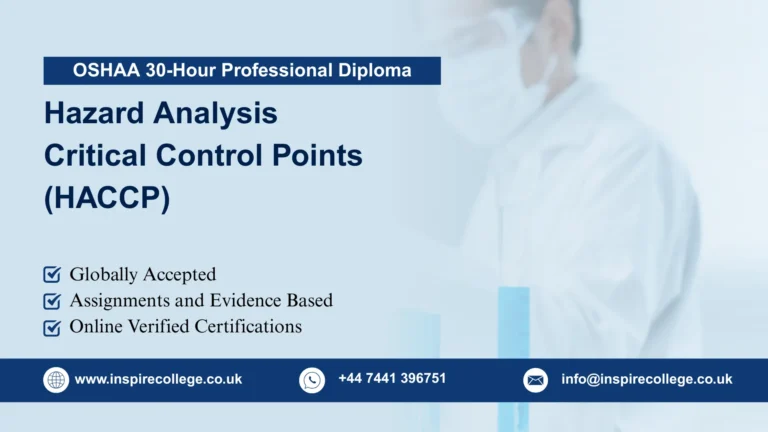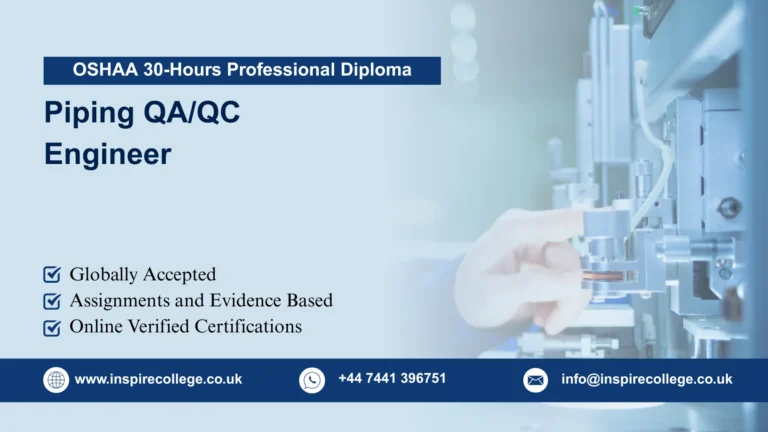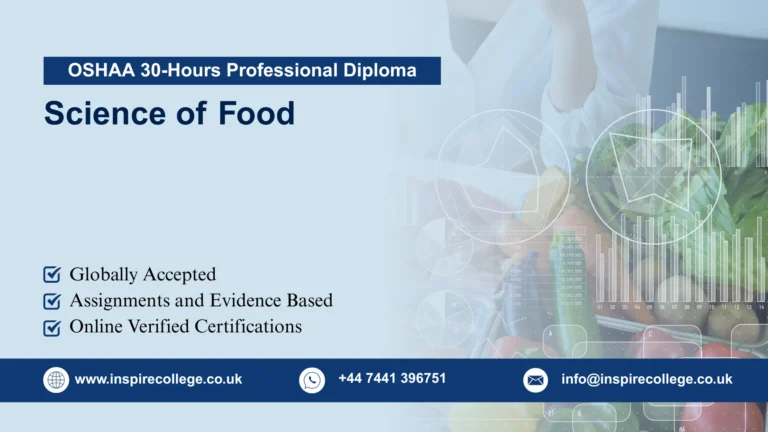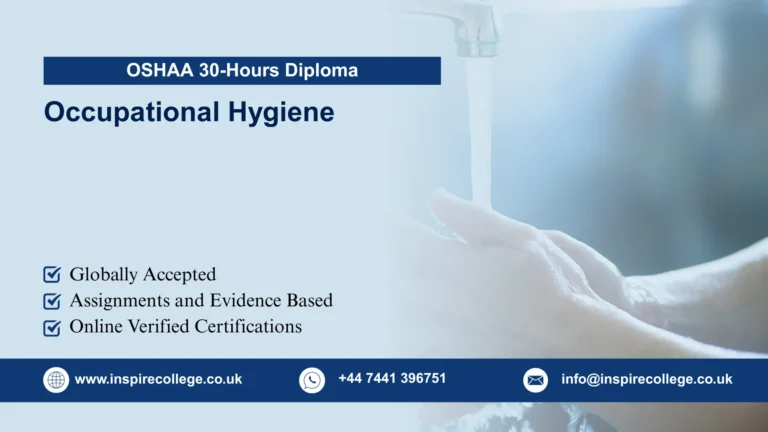
OSHAA 30-Hours Professional Diploma in Food Safety and Hygiene
Food safety and hygiene are critical pillars for protecting public health, ensuring regulatory compliance, and maintaining consumer trust. Contaminated or improperly handled food can lead to severe health risks, reputational damage, and financial losses for organizations. The OSHAA 30-Hours Professional Diploma in Food Safety and Hygiene is designed to equip professionals with the knowledge, practical skills, and competence needed to maintain safe, hygienic, and compliant food operations across diverse industries.
OSHAA 30-Hours Professional Diploma in Food Safety and Hygiene provides comprehensive coverage of essential food safety and hygiene principles, including foodborne illnesses, contamination prevention, hazard analysis, and critical control points (HACCP). Participants will also gain practical expertise in safe food handling, storage, temperature control, personal hygiene, cleaning and sanitation, pest control, allergen management, and traceability systems. Additionally, learners will develop an understanding of legal and regulatory frameworks governing food safety, enabling them to apply international standards in real-world workplace settings.
By completing the OSHAA 30-Hours Professional Diploma in Food Safety and Hygiene, learners will acquire the knowledge, skills, and practical competence necessary to effectively identify, assess, and control potential hazards across all stages of food handling and production. Participants will be trained to implement evidence-based control measures, ensuring that food hygiene and safety standards meet both national and international regulatory requirements.The program emphasizes practical applications, enabling learners to apply theoretical concepts to real-world scenarios in various industries, including food manufacturing, catering services, retail, healthcare, and hospitality. Graduates will gain the ability to monitor critical control points, manage contamination risks, implement proper sanitation protocols, and ensure compliance with HACCP principles and other food safety management systems.
The OSHAA 30-Hours Professional Diploma in Food Safety and Hygiene is ideal for food safety officers, quality assurance managers, EHS professionals, supervisors, and anyone responsible for food handling and compliance. Beyond advancing professional competence, this diploma contributes to Continuing Professional Development (CPD) and empowers learners to implement sustainable food safety practices that protect consumers, enhance organizational efficiency, and foster a culture of hygiene and safety globally.
To ensure learners are well-prepared to benefit fully from the OSHAA 30-Hours Professional Diploma in Food Safety and Hygiene, applicants should meet the following requirements:
- Age Requirement
- Applicants must be at least 18 years old at the time of enrollment.
- This ensures maturity and readiness for professional-level training in food safety and hygiene.
- Educational Requirements
- Minimum of a high school diploma or equivalent qualification.
- Candidates with prior education in food science, nutrition, microbiology, environmental health, or related fields will have an advantage.
- Additional certifications in hygiene, quality assurance, or safety management are considered beneficial.
- Professional Experience
- While prior experience is not mandatory, it is recommended for enhanced practical understanding.
- Ideal candidates include food safety officers, quality assurance managers, production supervisors, catering and kitchen staff, and EHS professionals.
- Experience in food handling, storage, preparation, or regulatory compliance adds value.
- Technical Skills
- Basic computer literacy is required, including the use of email, online learning platforms, and workplace documentation systems.
- Familiarity with Microsoft Office (Word, Excel, PowerPoint) or equivalent software is beneficial for reporting and documentation.
- Motivation and Commitment
- Learners must demonstrate a genuine interest in food safety, hygiene, and regulatory compliance.
- Commitment to completing 30 hours of structured learning, including practical exercises and assessments, is essential.
- Strong dedication to professional growth and workplace improvement is expected.
- English Language Proficiency
- Good command of written and spoken English is required.
- Learners must be able to understand technical terminology, food safety regulations, and communicate effectively in professional environments.
Mandatory Units
The OSHAA 30-Hours Professional Diploma in Food Safety and Hygiene, to achieve the qualification candidates must complete all the mandatory units form the following :
Mandatory Units
- Introduction to Food Safety and Hygiene
- Types of Foodborne Hazards
- Safe Food Handling Practices
- Cleaning and Sanitisation in Food Safety
- Personal Hygiene and Workplace Practices
- Food Safety Management Systems
- Health and Safety Protocols in Food Environments
- Food Safety Audits and Inspections
The OSHAA 30-Hours Professional Diploma in Food Safety and Hygiene equips learners with the practical knowledge, technical skills, and professional competence required to ensure safe and hygienic food operations. Participants will develop the ability to implement effective food safety practices, manage risks, and comply with international regulations, enhancing workplace standards across diverse food-related industries.
1. Introduction to Food Safety and Hygiene
Learners will gain a foundational understanding of food safety and hygiene principles, emphasizing their critical role in public health, consumer protection, and organizational compliance. They will be able to:
- Define key concepts such as contamination, cross-contamination, hygiene, and risk management.
- Explain the significance of maintaining safe food practices across the supply chain.
- Understand the relationship between food safety, quality control, and consumer confidence.
- Recognize the impact of inadequate food safety practices on public health and business operations.
2. Types of Foodborne Hazards
Participants will explore the various biological, chemical, and physical hazards that can compromise food safety, and develop the ability to manage these risks effectively:
- Identify common biological hazards, including bacteria, viruses, parasites, and fungi, that cause foodborne illnesses.
- Recognize chemical hazards such as pesticides, food additives, and toxins.
- Understand physical hazards, including foreign objects that may contaminate food.
- Apply strategies to prevent contamination and reduce the risk of hazards throughout the food handling process.
3. Safe Food Handling Practices
Learners will develop hands-on skills in food handling to minimize contamination and ensure product safety:
- Demonstrate proper techniques for food preparation, storage, and serving.
- Implement temperature control measures to prevent spoilage and bacterial growth.
- Apply procedures to avoid cross-contamination between raw and cooked foods.
- Develop effective inventory management systems to maintain food quality and safety.
4. Cleaning and Sanitisation in Food Safety
This unit emphasizes maintaining hygienic environments to prevent contamination:
- Design and implement cleaning and sanitization schedules for all food handling areas.
- Select and correctly use appropriate cleaning agents, disinfectants, and sanitation tools.
- Establish procedures for routine inspections and monitoring of cleanliness.
- Integrate effective pest control measures to maintain a safe and hygienic food environment.
5. Personal Hygiene and Workplace Practices
Learners will understand the critical role of personal hygiene and safe workplace behavior in ensuring food safety:
- Apply correct handwashing techniques and the use of protective clothing.
- Promote safe behaviors and workplace practices to minimize contamination risks.
- Evaluate how personal conduct impacts overall food hygiene standards.
- Develop and maintain a culture of hygiene compliance among staff.
6. Food Safety Management Systems
Participants will gain expertise in structured food safety management systems, including HACCP:
- Understand the principles of Hazard Analysis and Critical Control Points (HACCP).
- Identify critical control points and implement monitoring procedures.
- Develop and manage food safety plans to prevent, control, and document hazards.
- Evaluate operational procedures and recommend improvements to ensure continuous compliance and safety.
7. Health and Safety Protocols in Food Environments
Learners will acquire skills to safeguard both employees and consumers by applying health and safety protocols:
- Identify occupational hazards specific to food production and handling environments.
- Implement workplace safety measures to prevent slips, burns, cuts, and chemical exposures.
- Ensure compliance with national and international occupational health and safety regulations.
- Promote a culture of safety that integrates food hygiene with employee wellbeing.
8. Food Safety Audits and Inspections
This unit focuses on assessing compliance and ensuring continuous improvement in food safety practices:
- Conduct thorough internal and external audits and inspections of food operations.
- Identify non-compliance issues, potential hazards, and areas for improvement.
- Prepare detailed reports with actionable recommendations for corrective actions.
- Monitor the effectiveness of interventions and ensure ongoing adherence to food safety standards.
The OSHAA 30-Hours Professional Diploma in Food Safety and Hygiene is designed for professionals who are committed to ensuring high standards of food safety, hygiene, and regulatory compliance in their workplace. This program is ideal for individuals who wish to enhance their practical skills, technical knowledge, and professional competence to manage foodborne hazards effectively and implement internationally recognized food safety practices.
This diploma is particularly suitable for:
- Food safety officers and quality assurance managers responsible for maintaining hygiene standards and ensuring safe food operations.
- Production supervisors, catering managers, and kitchen staff working in restaurants, hotels, hospitals, or institutional food services.
- Environmental Health and Safety (EHS) professionals overseeing compliance with food safety legislation and hygiene protocols.
- Employees involved in food handling, storage, transportation, or preparation in manufacturing, retail, or hospitality sectors.
- Graduates and professionals from nutrition, food science, microbiology, health sciences, or related fields seeking specialization in food safety and hygiene.
- Individuals committed to Continuing Professional Development (CPD) and career growth in occupational food safety and hygiene management.
By completing this diploma, learners will acquire the knowledge, practical skills, and professional confidence to implement effective food safety strategies, monitor hazards, conduct audits, and maintain safe, hygienic, and compliant food environments. Graduates will be fully equipped to enhance public health, improve operational efficiency, and foster a sustainable culture of food safety across diverse industries globally.
Register Now
OSHAA 30-Hours Professional Diploma in Food Safety and Hygiene






